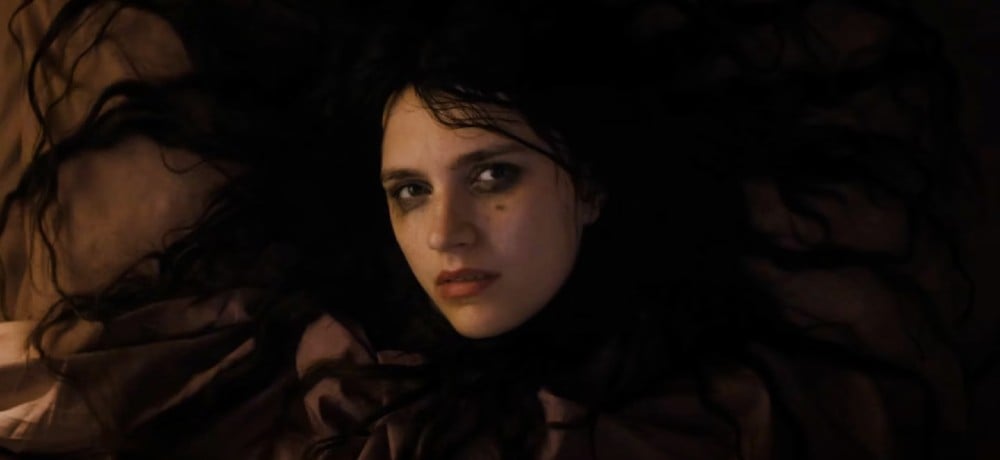


Nobody could predict that a theatrical Omen prequel would go as hard as Arkasha Stevenson’s The First Omen. There’s minimal wiggle room for narrative surprises leading into 1976’s blasphemous horror tale about the antichrist, yet Stevenson oversees a frightening and stimulating franchise origin. Rosemary’s Baby and The Omen surface as obvious sources of inspiration, but The First Omen compares cleanest to Neon’s religion-roasting Sydney Sweeney vehicle Immaculate. Stevenson unleashes astonishingly graphic imagery that’d make Immaculate blush, and despite how the two-hour running time presents laggy pacing issues, The First Omen successfully executes standalone appeal while fulfilling its promise of being all for you, Damien.
The film’s events occur in Rome’s Vizzardeli Orphanage, where American candidate Margaret Daino (Nell Tiger Free) transfers to earn her status as a Sister. Cardinal Lawrence (Bill Nighy) extends a familiar welcome since he’s known Margaret since childhood. Sister Silvia (Sônia Braga), the Abbess of Vizzardeli, settles Margaret into their pious program — unlike her roommate Luz (Maria Caballero), who pushes for nightclub visits before they utter their final vows. Margaret falls into place as a devout woman of God, charmed by Vizzardeli’s community, until she gets too close to an ostracized outcast named Carlita Skianna (Nicole Sorace) and begins to question Sister Silvia’s harsh disciplinary methods.
The writing trust of Stevenson, Tim Smith, and Keith Thomas rightfully use Damien’s inevitable birth to eviscerate the church’s unconscionable treatment of women’s bodies. It’s not a spoiler to say this movie is about pregnancy — the only prequel angle available for The Omen — but it’s noteworthy how impregnation and bodily autonomy work in the story’s favor. The First Omen doubles whatever allegorical symbolism exists in Immaculate, fearlessly heaping protest onto traditional Catholic beliefs about childbearing. Women in the film are meant to serve one God or pump out future congregation members, which becomes a fiery source of anger as Margaret tangles in Vizzardeli’s web of lies. Just because we know where The First Omen is headed doesn’t mean they squander the opportunity to unleash evergreen rage about how religion oppresses women, or far, far worse.
Stevenson’s feature debut creates masterstrokes of female body horror, turning natural miracles into inhuman monstrosities. It’s not just about gratuitous kill sequence gore, which provides violent shocks as characters around Carlita endure fatal abdomen wounds or bludgeoned opened skulls. There’s a childbirth scene that deserves a standing ovation; Cinematographer Aaron Morton holds on what might be shown in a satanic sex education class until the unthinkable happens (a shot so traumatizing it first earned the film an NC-17 rating). Stevenson’s exceptional confidence in delivering uncensored visual nasties feels so roguishly punk-rock, especially when you consider 20th Century Studios is under Disney’s umbrella. The palpable discomfort of a slimy demonic tongue licking over Margaret’s body or the atrocities committed unto innocent female flesh is something we don’t often see in today’s mainstream genre spaces (to this extent), making Stevenson’s punitiveness when forcing disturbing imagery down our throats even more jaw-dropping.
Nell Tiger Free is a primetime lead as the ever-naive Margaret, whose performance seethes with intensity the more she interrogates the church’s hypocritical teachings. The First Omen sells its horrors partly on special effects superiority but also Free’s painfully tormented reactions that are giving Shelley Duvall in The Shining. It helps that she’s flanked by veterans like Bill Nighy and his character’s antithesis in Ralph Ineson’s conspiratorial Father Brennan. Nighy delivers this awesomely detestable line about having to defeat secularity (like the church is a corporate entity) that defines supporting character importance, letting Free’s facial response match our repulsion. Not to forget others like Sônia Braga’s heavy handed Mother Superior type or Maria Caballero’s embodiment of temptation in a sequined cocktail dress, who spar with Margaret as Vizzardeli defenders.
Although, the real demon of The First Omen is the film’s length. Storytelling boasts originality, and visuals burst with hellacious innovation, but the midsection feels like slowly dragging on a cigarette instead of enduring the stick’s full burn. As Stevenson pays homage to famous quotes from The Omen and nods to illustrious ‘70s-era priestly horror classics, you can feel the film stopping to catch its breath. It’s most evident during the finale, well over the 100 minute mark, when finality trickles to a head. The First Omen is at its worst when trying to link back into the larger franchise, beholden to connecting bits and bobs. Sections of the film burst forward like they have rocket boosters attached, while others lull into a hymnal tone that emits on a low frequency made more noticeable by the bookend jolts of adrenaline.
The First Omen is damnation at its finest when revving its unholy motors. Prequels like Pet Sematary: Bloodlines prove how hard it can be to recreate a franchise’s trademark magic, where Arkasha Stevenson rises above the challenge. A glorious condemnation of the church’s appalling disregard for equality stings throughout Margaret’s investigation, going places where even the unshy and experimental Immaculate doesn’t dare step. One sequence in particular is seared into my memories forever (you’ll know); a testament to the unrestricted approach Stevenson demands. With better flow, it’d be something special; as is, it’s an attention-grabbing debut for Stevenson that packs a petrifying punch we won’t forget any time soon.
Movie Score: 3.5/5